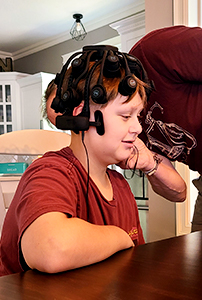Neurofeedback: A better brain, a better you!
July 28, 2021

 |
By: Scott Williams Counsellor & Clinical Supervisor |
Neurofeedback: A better brain, a better you!
It’s amazing to realize that just a few decades ago, humans didn’t know that our brains can continue to change and grow throughout our lives. Today we have tools like EEGs and CAT scans, fMRIs and PET scans to help us understand how our bodies — and our brains — work, and how to create health and wellness. At Pivot Point we use Brainwave Neurofeedback to help clients improve their brain function and their overall brain health.
As you may already know, your brain is constantly emitting electrical energy; it’s like a signal, constantly broadcasting what it’s doing. We can’t measure WHAT you are thinking… but we can measure how WELL you are thinking. With tiny sensors placed onto your scalp, we can measure that electrical current, and see if your brain is performing optimally, or if it is struggling in any specific way. Think of it like a “brain fitness evaluation”. Is your brain overactive or underactive? This can help us tell if you’ve likely had a concussion, or if your brain is more anxious or depressed. Is your brain “flexible” and able to move energy around, so that it can do different tasks for you, or does it get stuck? This may say a lot about whether a brain performs like a person with ADHD, OCD or even Autism. Can your brain increase and decrease its activity level? If not, you may take a long time to fall asleep at night, and then struggle to wake up in the morning when you need to.
It’s all about brain performance!
When our brains work well for us, we can focus when we need to, and yet quickly relax into calm peacefulness when it’s the right time for a break. We have the attention to think through problems, and the capacity to keep our emotions from taking over if the situation is upsetting. Optimal brain performance unlocks other brain tools as well, like memory, and creativity, and prediction, and emotional awareness (or mindfulness), and social awareness (of other’s perspectives)… which all help us function more successfully in life.
How does Neurofeedback work?
Neurofeedback measures the electrical activity in your brain using small sensors placed on the scalp. These sensors send the brain wave information to a computer that monitors your brain and can tell when things are out of alignment. The computer recognizes unhelpful patterns, and sends auditory signals through earbuds to encourage your brain to shift what it is doing. This is going on thousands of times a minute, most of the time you don’t even notice those quiet sounds, like a subtle scratch on a music record or CD. All this happens while playing a video game, watching a movie, having a conversation, or doing a guided meditation.
There is no electricity going into your brain, only very quiet clicks and ticks, perfectly timed with what your brain just did…. to tell your brain to do something different next time. Over a short period of time, your brain will adapt and change in response to this feedback; adjusting its performance in an attempt to reduce the feedback. This process can train your brain to be more FLEXIBLE (letting go of an idea and moving on to the next, so your “stuckness” or OCD fades), or more RESPONSIVE in managing the amount of energy it’s producing, (like, decreasing brain energy at night so you can fall asleep faster). It can also make your brain more RESILIENT, letting it fight off distraction when you need to focus, or hold back an emotional response when you need to finish giving a presentation, or devote your brain resources to thinking about solutions.
Neurofeedback has changed the brains and lives of millions of people. Your brain can learn and change too, given the right feedback, and that can lead you towards living a better YOU!
Visit our Neurofeedback Page to learn more about Pivot Point’s NeuroFeedBack services, or book a free consultation by submitting our Explore Mental Health form so that we can help you find out if this service is right for you, or for someone you love.



 Ontario Regional Manager
Ontario Regional Manager

 Complex Care Program Manager
Complex Care Program Manager Adult Services & Transition Planning Program Manager
Adult Services & Transition Planning Program Manager



